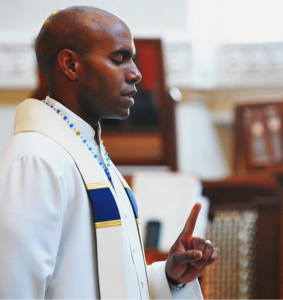Feb. 2 marks the 76th anniversary of the sinking of the SS Dorchester, a transport ship taking hundreds of troops to Greenland during World War II.
Among the 672 who died in the U-Boat attack in 1943 were four Army chaplains who, many survivors said, brought calm to the panic and who gave up their own life jackets – and lives – to others.
Now known as Four Chaplains Day, the commemoration is a reminder of the courage and trust in God still required of military chaplains today, said Lt. Cmdr. Keith Carter, a Navy chaplain ordained by the National Baptist Convention USA.

Keith Carter
“I just hope and pray that no matter what I am asked to do by the U.S. military, that I am a bearer of God’s presence,” said Carter, currently serving as deputy director for plans and operations for the Navy’s Chief of Chaplains.
Like other military personnel, chaplains never know when their lives will be required. And the challenges can be great even when the ultimate sacrifice is not required, Carter said.
Much of the preparation comes from principles that most any minister can identify with.
“I challenge myself every day to make sure I look like Christ, and you don’t have to be a Christian to appreciate that,” he said. “You may be Jewish, Muslim, Hindu or Buddhist – or you may not have a faith at all. But if I am living out my faith that’s all that matters because I have loved you like Christ would.”
Carter, 39, said he heard that very calling long before ordination in 2006 – throughout his pre-Navy career that included work as a television journalist and selling insurance.
In an interview with Baptist News Global, he shared how his faith developed in depth and focus and led him to service in uniform. His comments are included here, edited for clarity.
How did you hear your calling during your TV journalism and other professions?
I knew I was called long before all of that started. But I also understood there was a season in my life where I wasn’t ready. I had to continue to listen to what God was telling me. God was shaping me, preparing me for things to come and showing me who he was. Every aspect of my life before active duty provided me a better understanding that God was saying “this is me, this is me shaping you, this is me who will always be by your side.”
Why did you choose the Navy over other branches of the military?
To me the Navy was the only option. I felt the sky was the limit. It offered the opportunity to preach on the flight deck of a ship and to marines about to go on a convoy, and to sailors going into dark and dangerous situations. It was attractive to me.
Did you ever deploy while serving as a chaplain to the Marines?
We went to Iraq. I can tell you that.
What do your duties entail at the Pentagon?
It is my responsibility to make sure we empower those chaplains and religious program specialists out in the fleet to do their jobs.
Is that as rewarding as being out in the fleet?
It’s all rewarding. It’s just a different type of ministry. It takes courage to speak out on their behalf. It requires courage to make sure I am always listening to them. It takes a certain kind of skill set to empower them. Some people love to use the term “administry.”
So, you’re a chaplain to the chaplains.
Exactly. We need to make sure we are caring for them and listening to them and making sure we are providing what they need.
In what ways have you seen God show up for the sailors and marines you have served – and for yourself?
I can tell you about serving on (the U.S.S.) Tortuga. While I was onboard that ship at sea, I watched as young sailors, just starting their careers, growing and developing as adults, encountered the Holy Spirit. Sailors would come to office and say “hey chaplain, have you got a minute?” As I listened to their stories, their maturity began to take over the room. You can see how the Lord was working in their lives.
Or when leading a worship service in the desert of Iraq and a guy tells you he is not a believer, but he comes to your worship service because he wants to know more about this God you are raving about. “I don’t understand how you can be so happy in the midst of what we are dealing with.” You can’t forget about things like that.
Why is it important to remember the sacrifice of the Four Chaplains?
That is a wonderful example of being a pastor in crisis. It was about taking care of people when it’s dark, when it’s scary. In that moment they demonstrated courage. They demonstrated loving someone when you are, no kidding, sitting on death’s door. Because they were.
When I think about their story, you know they were scared. They had to be scared. But they went through the experience together. As a military chaplain, there are so many other men and women who are looking to you in a crisis. In some of the hairier times, I have tried to be as calm as possible. That doesn’t mean I am not scared. But I have to have a trust that the Lord is going to see it through.
